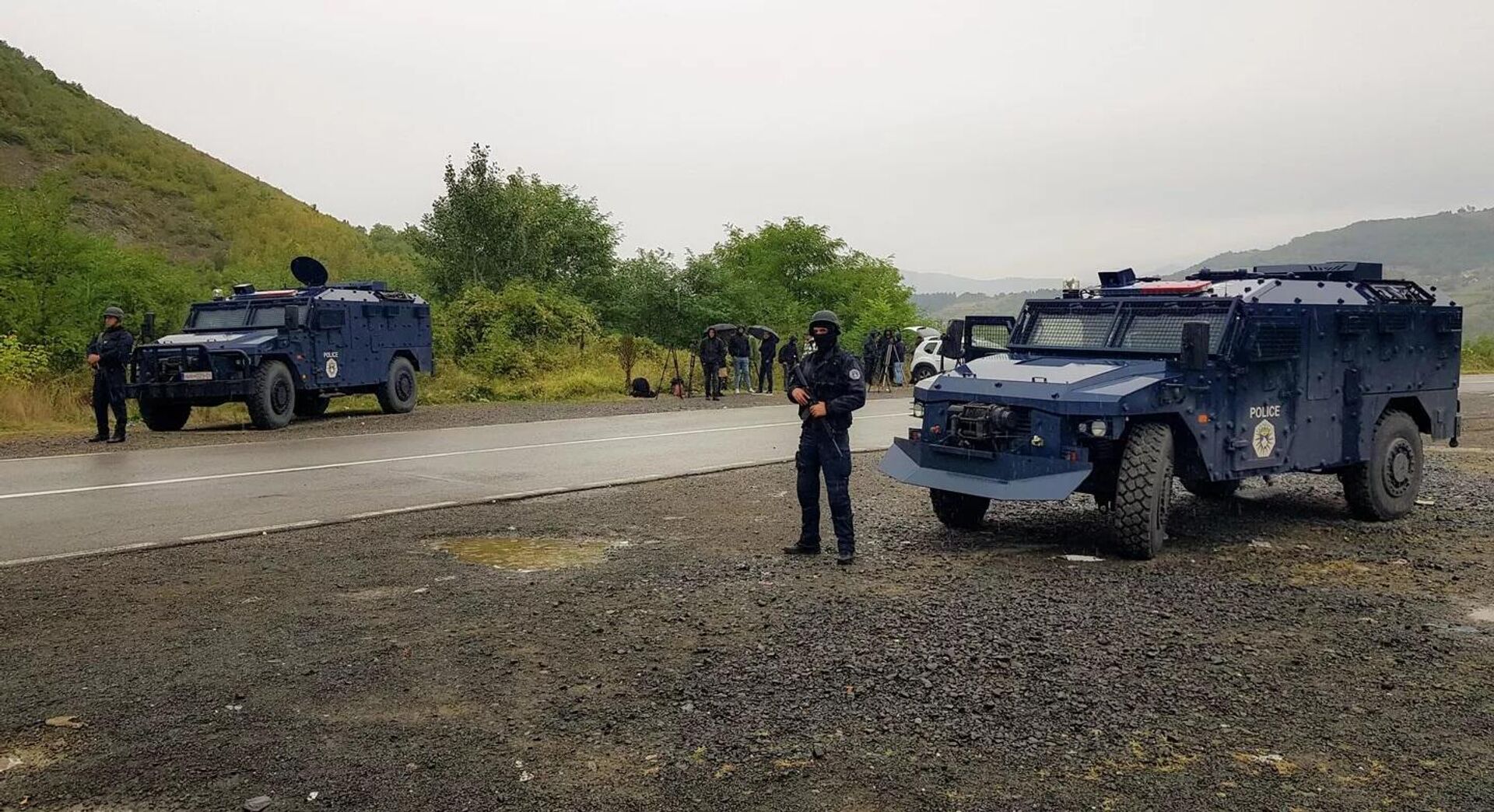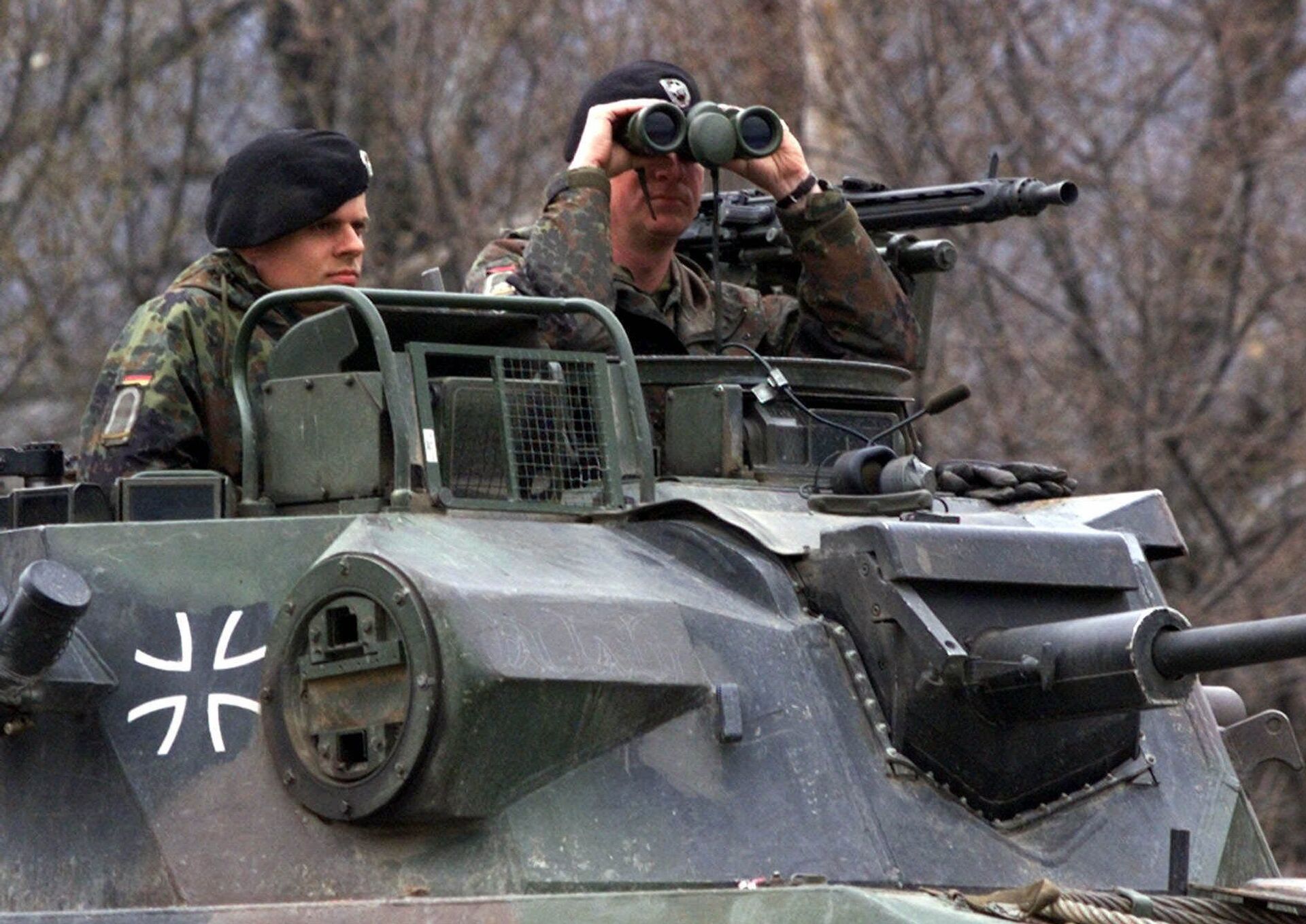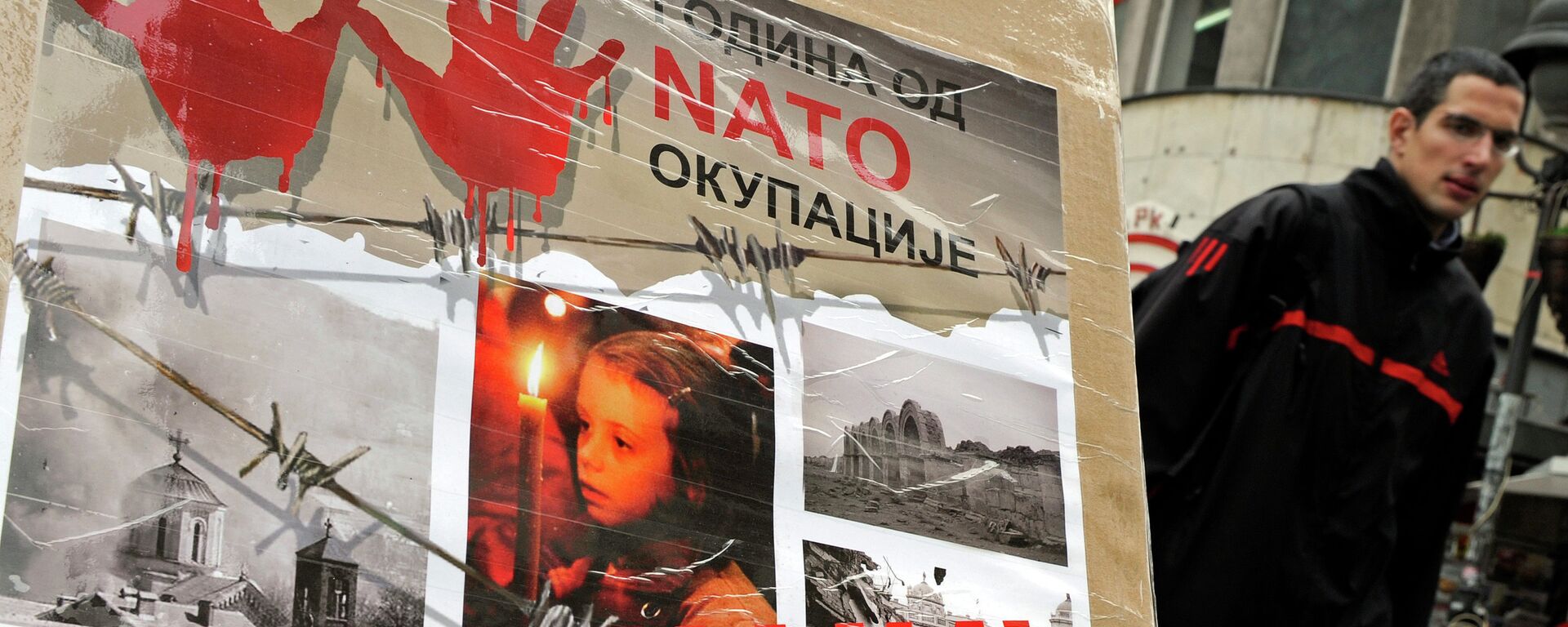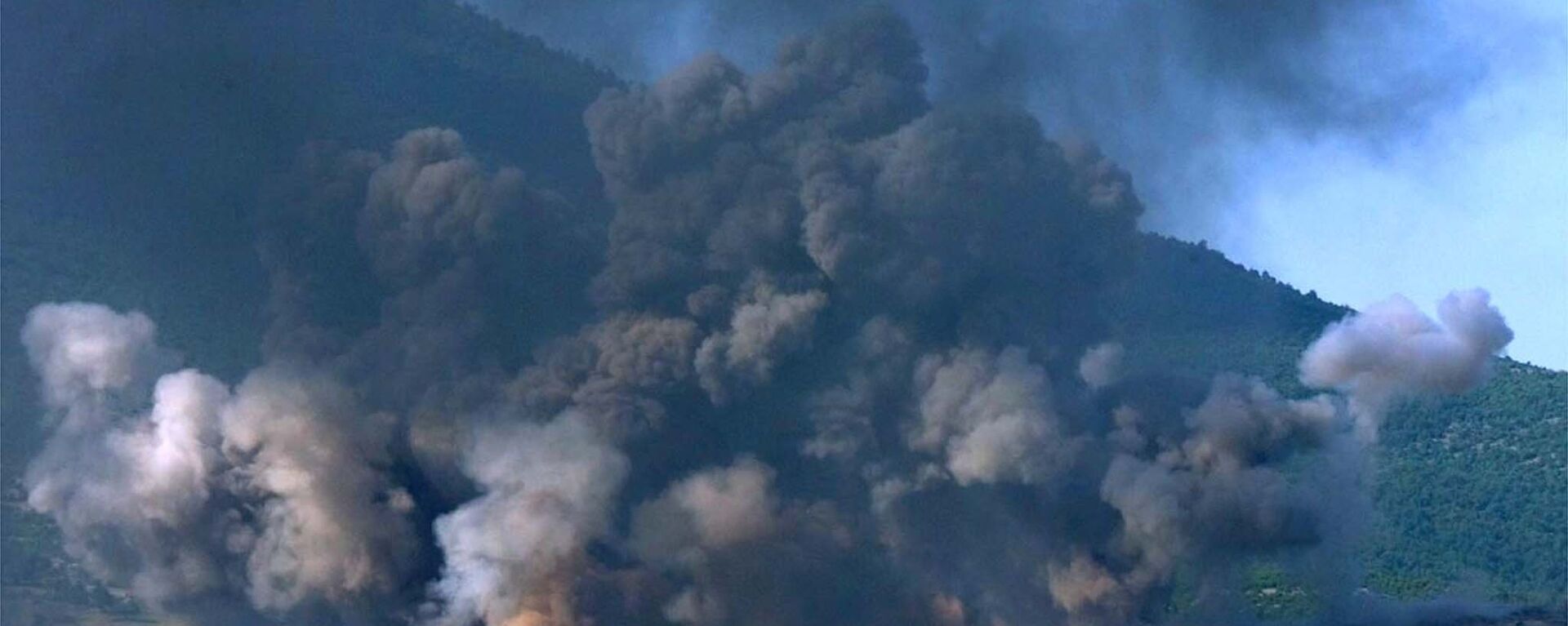https://sputnikglobe.com/20221212/kosovo-conflict-is-part-of-us-eu-and-natos-broader-plan-aimed-against-serbia--russia-experts-say-1105391084.html
Kosovo Conflict is Part of US, EU and NATO's Broader Plan Aimed Against Serbia & Russia, Experts Say
Kosovo Conflict is Part of US, EU and NATO's Broader Plan Aimed Against Serbia & Russia, Experts Say
Sputnik International
Kosovo and Metohija Serb leader Goran Rakic announced on December 12 that a crisis headquarters would be created to provide civilians and the media with... 12.12.2022, Sputnik International
2022-12-12T15:34+0000
2022-12-12T15:34+0000
2022-12-12T15:34+0000
analysis
us
opinion
europe
russia
nato
yugoslavia
nato’s 1999 military intervention in yugoslavia
1999 nato bombings
kosovo force (kfor)
https://cdn1.img.sputnikglobe.com/img/105043/31/1050433126_0:0:3841:2162_1920x0_80_0_0_f1d84689218068b8451f0c5670822522.jpg
"A standoff in the predominantly Serbian northern Kosovo was sparked by an arrest of a former police officer [Dejan Pantic] accused of attacking a Kosovo law enforcement patrol," Scott Bennett, a former US psychological warfare officer and State Department counterterrorism analyst, and former Booz Allen Hamilton contractor, told Sputnik.The Albanian population of Serbia's province of Kosovo unilaterally declared independence from Serbia in February 2008. Serbia has de facto not controlled the territory of its southern province since 1999, after the US-led NATO invasion of Yugoslavia, which was the first all-out war in Europe after the Second World War. Even though the so-called Republic of Kosovo has been recognized by the US and less than half of the international community, Serbia's territorial integrity is confirmed by United Nations Security Council Resolution 1244 of June 10, 1999. Hence, there is no state border between them, but just an internal border line.This summer, tensions erupted around the self-proclaimed Republic of Kosovo after Pristina decided to impose a ban on the entry of vehicles with Serbian license plates from August 1, 2022. This prompted Serbs, who maintain large communities in northern Kosovo, to hold protests against the move. Pristina's initiative was clearly in breach of the 2013 Brussels Agreement. The agreement guaranteed that "there will be an association/community of Serb majority municipalities in Kosovo" with substantial local powers and ties to Serbia. The treaty was negotiated and concluded in Brussels under the auspices of the European Union.On July 31, 2022 the Russian Foreign Ministry lambasted Pristina and its backers in Brussels and Washington for an attempted expulsion of the Serbian population and Serbian social institutions from Kosovo, calling upon the international community to observe the rights of Serbs in the region.At the time, the de-facto Albanian authorities of the region backed down, but the conflict erupted again in December.Tensions Flare Up Again in DecemberOn Thursday, December 8, the "customs" of the self-proclaimed republic confiscated a batch of 42,000 liters of wine from one of the oldest Serb producers in the village of Velika Hoča in the southwest of the region. The formal reason was that the activities of the manufacturer's legal entity were frozen during the COVID pandemic. De facto customs officers drove the tank to the wine cellar and poured all sorts of wine into it, thereby actually destroying the high-quality product, which would be impossible to consume if returned.On December 10, the self-declared republic's security forces detained 56-year-old former Serb police officer Dejan Pantic on "suspicion of terrorism." Pantic resigned in November along with other Serbian law enforcement personnel from the self-proclaimed republic’s Interior Ministry. At the time, some Serbs living in Kosovo deliberately withdrew from local government institutions in protest against Pristina's decision to fine anyone who did not change their Serbian car registration plates to Kosovo ones. Pantic was arrested while trying to enter central Serbia.Pantic's arrest prompted Kosovo Serbs to blockade roads and checkpoints on the administrative line between Kosovo and central Serbia. After that, employees of the European Union Rule of Law Mission (EULEX) in Kosovo and KFOR – the NATO-led international force in Kosovo – were dispatched to the barricades. NATO reportedly has roughly 3,700 personnel stationed in Serbia's province.The media reported interruptions in Internet and mobile communications. Gunshots were also heard in the north of Kosovo. Eventually, Kosovo's de facto President Vjosa Osmani announced that local elections scheduled for December 18, 2022 would be postponed until next year.Meanwhile, Serbia's President Vucic announced on Saturday that he would make a request to the commander of NATO’s KFOR mission to deploy a 1,000-strong Serbian contingent in the north of Kosovo to protect Serbs under UN Security Council Resolution 1244. The resolution authorizes Serbia to deploy up to 1,000 military, police, and customs officials to Kosovo's Orthodox Christian religious sites, areas with Serb majorities, and border crossings, if such a deployment is approved by KFOR's commander. However, Vucic added that he had "no illusions" that his request would be approved by NATO.US and Brussels are Behind Kosovo ConflictAccording to Bennett, the escalation of tensions over Kosovo was provoked by the US and its Western allies in order to tighten the screws on Belgrade, with whom Russia has a longstanding special relationship, amid Moscow's special military operation to demilitarize and de-Nazify Ukraine.Hysteria has already engulfed Brussels and Pristina, with EU foreign policy chief Josep Borrell trying to threaten Belgrade over possible attacks on the EULEX and Kosovo's de facto Prime Minister Albin Kurti urging the West to "punish" Serbia."The EU has behaved as a biased side from the beginning," Professor Stevan Gajic, a research associate at the Institute of European Studies in Belgrade, told Sputnik. "And this was obvious, since the negotiations were basically lowered to the level of the EU from the level of the United Nations. The EULEX was biased. The whole process of Brussels agreements was only a sham in order for Serbia to give up all its state powers that it had. It is only logical that now the EU behaves like this. This might be a provocation. Serbia is very calm, actually trying not to use force to defend its citizens. But it only depends on the Western structures, whether they want to escalate or de-escalate this conflict."Gajic noted that nothing has changed in the West's perception of Serbia over the last two centuries: "[T]he Serbs resisted Hitler's pact [in July 1941] and we were bombed and consequently occupied," he noted, referring to Nazi Germany's occupation and subsequent division of the Kingdom of Yugoslavia in 1941 and Serbia's resistance movement.The West is currently trying hard to sever ties between Moscow and Belgrade by both demanding that Serbia impose sanctions on Russia, and pressuring Belgrade into signing a comprehensive peace agreement with Pristina, which would pave the way to Serbia losing its Kosovo province, according to Trifkovic.In addition to that, the West seems eager to twist Belgrade's hand into dropping its partnership with Moscow because the US and EU's anti-Russia sanctions have turned out to be a complete failure, according to Bennett. "Former Austrian Vice-Chancellor Heinz-Christian Strache has said Europeans are bearing the brunt of the crisis, while Moscow’s economy is doing fine," the former US State Department counterterrorism analyst remarked. The West's inability to "rein in" Moscow is casting a shadow over its image as leader of the world order.US/NATO Kosovo and Ukraine CasesOne shouldn't be deluded into believing Washington or Brussels' statements about their intent to maintain peace and stability in Kosovo, according to Bennett. "As we have seen in the past, the promises and agreements made by the West, by the EU, and by NATO are worthless and not to be trusted," he stressed.Another telling moment, according to Bennett, is former German Chancellor Angela Merkel's recent remarks about the 2015 Minsk Agreements, which deeply frustrated President Vucic:"President Vucic describe[ed] how amazed, shocked, and disappointed he was to discover that Germany’s former Chancellor Angela Merkel has admitted what many people suspected all along: that the promises made by Germany and France in the Minsk agreements were never intended to be honored, and were instead simply a ruse or lie intended to generate space and time for the Ukrainian military to build up its ability to wage a proxy war against Russian civilians. President [Vladimir] Putin has also commented on the deceitfulness of this grotesque betrayal, but then again, betrayal and monstrous ugliness seems to be fast becoming the main characteristic of the European Union’s character," Bennett observed.Meanwhile, there are numerous similarities between the involvement of American politics in Kosovo and Ukraine, said Trifkovic.She noted that in both cases, the US, as well as other Western countries, supported extremism, fuelled militant nationalism directed against the Serbs and the Russians in Kosovo and Ukraine, respectively. NATO also provided logistical and material support, so the extremists underwent training and received weapons, according to her. Meanwhile, the Western mainstream media actively spread anti-Serbian and anti-Russian propaganda, with numerous Western-funded NGOs joining the media chorus, the Serbian geopolitical analyst pointed out.
https://sputnikglobe.com/20221212/serbs-to-set-up-crisis-headquarters-in-northern-kosovo-1105365006.html
https://sputnikglobe.com/20181010/nato-yugoslavia-war-crimes-1068738476.html
https://sputnikglobe.com/20220324/vucic-slams-natos-ridiculous-russia-accusations-over-ukraine-recalls-illegal-bombing-of-serbia-1094146800.html
https://sputnikglobe.com/20220324/how-us-nato-illegal-bombing-of-yugoslavia-undermined-rule-of-law-in-the-world-23-years-ago-1094157612.html
russia
yugoslavia
kosovo
Sputnik International
feedback@sputniknews.com
+74956456601
MIA „Rossiya Segodnya“
2022
News
en_EN
Sputnik International
feedback@sputniknews.com
+74956456601
MIA „Rossiya Segodnya“
Sputnik International
feedback@sputniknews.com
+74956456601
MIA „Rossiya Segodnya“
kosovo, kfor, serbia, nato 1999 bombing of yugoslavia, nazi germany, european union, russia, albanians, kosovo serbs
kosovo, kfor, serbia, nato 1999 bombing of yugoslavia, nazi germany, european union, russia, albanians, kosovo serbs
Kosovo Conflict is Part of US, EU and NATO's Broader Plan Aimed Against Serbia & Russia, Experts Say
Kosovo and Metohija Serb leader Goran Rakic announced on December 12 that a crisis headquarters would be created to provide civilians and the media with first-hand information about the simmering crisis in the north of the region. Meanwhile, the self-proclaimed Albanian leadership of the so-called Republic of Kosovo is urging NATO to step in.
"A standoff in the predominantly Serbian northern Kosovo was sparked by an arrest of a former police officer [Dejan Pantic] accused of attacking a Kosovo law enforcement patrol," Scott Bennett, a former US psychological warfare officer and State Department counterterrorism analyst, and former Booz Allen Hamilton contractor, told Sputnik.
"Serbian protesters erected barricades over the weekend to stop Kosovo police from entering a town and launching any kind of a terror operation against the Serbian people. Tensions were already running high after Pristina announced snap elections in the area, which were expected to be boycotted by all Serbian parties. On Saturday, Kosovo’s [de facto] President Vjosa Osmani postponed the vote until April," Bennett continued.
The Albanian population of Serbia's province of Kosovo unilaterally declared independence from Serbia in February 2008. Serbia has de facto not controlled the territory of its southern province since 1999, after the US-led NATO invasion of Yugoslavia, which was the first all-out war in Europe after the Second World War.
Even though the so-called Republic of Kosovo has been recognized by the US and less than half of the international community, Serbia's territorial integrity is confirmed by United Nations Security Council Resolution 1244 of June 10, 1999. Hence, there is no state border between them, but just an internal border line.
This summer, tensions erupted around the self-proclaimed Republic of Kosovo after Pristina decided to impose a ban on the entry of vehicles with Serbian license plates from August 1, 2022. This prompted Serbs, who maintain large communities in northern Kosovo, to hold protests against the move.
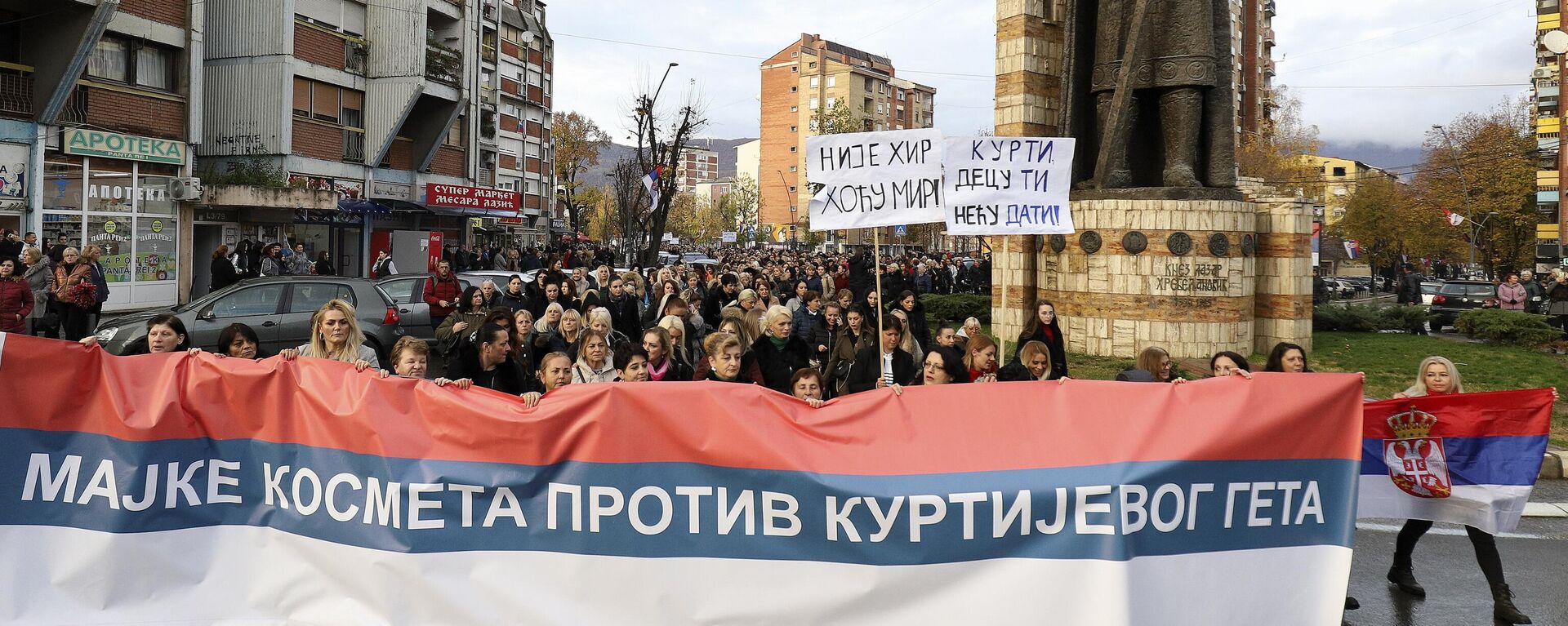
12 December 2022, 02:22 GMT
Pristina's initiative was clearly in breach of the 2013 Brussels Agreement. The agreement guaranteed that "there will be an association/community of Serb majority municipalities in Kosovo" with substantial local powers and ties to Serbia. The treaty was negotiated and concluded in Brussels under the auspices of the European Union.
"The Brussels negotiations between Belgrade and Pristina did not bring any positive result for Serbia, but led to the violation of international law, i.e. Resolution 1244, and the Constitution of Serbia," Dragana Trifkovic, director of the Center for Geostrategic Studies, told Sputnik. "At the same time, the Pristina side did not even fulfill what it committed to in the Brussels agreement. Therefore, the only solution would be for Serbia to announce that it is canceling the Brussels agreement and request that the negotiation process continue in the UN, where it is the place for negotiations if we take into account the fact that the status of Kosovo cannot be resolved outside the framework of the UN Security Council. Attempts by the West to resolve the Kosovo issue outside the framework of international law must be condemned."
On July 31, 2022 the Russian Foreign Ministry lambasted Pristina and its backers in Brussels and Washington for an attempted expulsion of the Serbian population and Serbian social institutions from Kosovo, calling upon the international community to observe the rights of Serbs in the region.
At the time, the de-facto Albanian authorities of the region backed down, but the conflict erupted again in December.
Tensions Flare Up Again in December
On Thursday, December 8, the "customs" of the self-proclaimed republic confiscated a batch of 42,000 liters of wine from one of the oldest Serb producers in the village of Velika Hoča in the southwest of the region. The formal reason was that the activities of the manufacturer's legal entity were frozen during the COVID pandemic. De facto customs officers drove the tank to the wine cellar and poured all sorts of wine into it, thereby actually destroying the high-quality product, which would be impossible to consume if returned.
On December 10, the self-declared republic's security forces detained 56-year-old former Serb police officer Dejan Pantic on "suspicion of terrorism." Pantic resigned in November along with other Serbian law enforcement personnel from the self-proclaimed republic’s Interior Ministry. At the time, some Serbs living in Kosovo deliberately withdrew from local government institutions in protest against Pristina's decision to fine anyone who did not change their Serbian car registration plates to Kosovo ones. Pantic was arrested while trying to enter central Serbia.
Pantic's arrest prompted Kosovo Serbs to blockade roads and checkpoints on the administrative line between Kosovo and central Serbia. After that, employees of the European Union Rule of Law Mission (EULEX) in Kosovo and KFOR – the NATO-led international force in Kosovo – were dispatched to the barricades. NATO reportedly has roughly 3,700 personnel stationed in Serbia's province.
The media reported interruptions in Internet and mobile communications. Gunshots were also heard in the north of Kosovo. Eventually, Kosovo's de facto President Vjosa Osmani announced that local elections scheduled for December 18, 2022 would be postponed until next year.
Meanwhile, Serbia's President Vucic announced on Saturday that he would make a request to the commander of NATO’s KFOR mission to deploy a 1,000-strong Serbian contingent in the north of Kosovo to protect Serbs under UN Security Council Resolution 1244.
The resolution authorizes Serbia to deploy up to 1,000 military, police, and customs officials to Kosovo's Orthodox Christian religious sites, areas with Serb majorities, and border crossings, if such a deployment is approved by KFOR's commander. However, Vucic added that he had "no illusions" that his request would be approved by NATO.
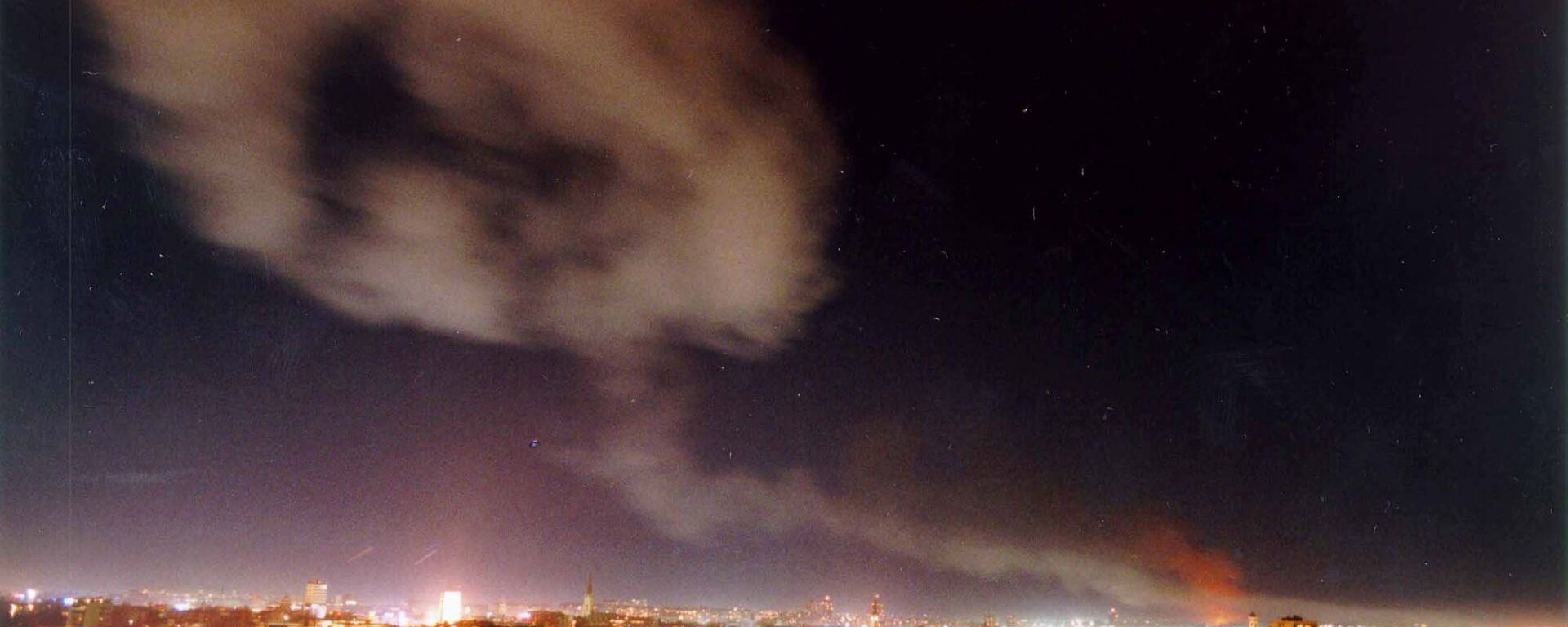
10 October 2018, 05:35 GMT
US and Brussels are Behind Kosovo Conflict
According to Bennett, the escalation of tensions over Kosovo was provoked by the US and its Western allies in order to tighten the screws on Belgrade, with whom Russia has a longstanding special relationship, amid Moscow's special military operation to demilitarize and de-Nazify Ukraine.
"It seems the West, and specifically the United States and its proxies in NATO, are planning a military pivot to open up a new civil war between Serbia and Kosovo, as a means of menacing Russia and opening up a potential new front," said Bennett. "So expect some kind of a false flag attack where the British-American intelligence services and military mercenaries artificially create a situation – most likely a bombing or massacre – and blame it on Serbia and Russia, to engineer yet another wave of hysterical EU sanctions and NATO military support for Kosovo against Serbia, and by proxy Russia."
Hysteria has already engulfed Brussels and Pristina, with EU foreign policy chief Josep Borrell trying to threaten Belgrade over possible attacks on the EULEX and Kosovo's de facto Prime Minister Albin Kurti urging the West to "punish" Serbia.
"The EU has behaved as a biased side from the beginning," Professor Stevan Gajic, a research associate at the Institute of European Studies in Belgrade, told Sputnik. "And this was obvious, since the negotiations were basically lowered to the level of the EU from the level of the United Nations. The EULEX was biased. The whole process of Brussels agreements was only a sham in order for Serbia to give up all its state powers that it had. It is only logical that now the EU behaves like this. This might be a provocation. Serbia is very calm, actually trying not to use force to defend its citizens. But it only depends on the Western structures, whether they want to escalate or de-escalate this conflict."
Gajic noted that nothing has changed in the West's perception of Serbia over the last two centuries: "[T]he Serbs resisted Hitler's pact [in July 1941] and we were bombed and consequently occupied," he noted, referring to Nazi Germany's occupation and subsequent division of the Kingdom of Yugoslavia in 1941 and Serbia's resistance movement.
"NATO already bombed us twice in the 1990s," the professor continued. "They bombed the positions of Serbs in Bosnia-Herzegovina, in Croatia in 1995, and then they bombed Yugoslavia, meaning Serbia and Montenegro, in 1999, directly supporting Albanian separatists and terrorists. Now they are again against the Serbs because they see us as proxies of Russia. And this didn't start yesterday, but it's been like that for the last 200 years, at least."
The West is currently trying hard to sever ties between Moscow and Belgrade by both demanding that Serbia impose sanctions on Russia, and pressuring Belgrade into signing a comprehensive peace agreement with Pristina, which would pave the way to Serbia losing its Kosovo province, according to Trifkovic.
"The request for the introduction of sanctions against Russia is related to this in the sense that the West believes that by severing the ties between Russia and Serbia, it would solve the Kosovo issue much faster in terms of the implementation of the Kosovo independence project," she explained. "Even if Serbia were to impose sanctions on Russia, which over 80% of the population of Serbia opposes, there would still be demands to sign a comprehensive peace agreement with Pristina."
In addition to that, the West seems eager to twist Belgrade's hand into dropping its partnership with Moscow because the US and EU's anti-Russia sanctions have turned out to be a complete failure, according to Bennett. "Former Austrian Vice-Chancellor Heinz-Christian Strache has said Europeans are bearing the brunt of the crisis, while Moscow’s economy is doing fine," the former US State Department counterterrorism analyst remarked. The West's inability to "rein in" Moscow is casting a shadow over its image as leader of the world order.
US/NATO Kosovo and Ukraine Cases
One shouldn't be deluded into believing Washington or Brussels' statements about their intent to maintain peace and stability in Kosovo, according to Bennett. "As we have seen in the past, the promises and agreements made by the West, by the EU, and by NATO are worthless and not to be trusted," he stressed.
Another telling moment, according to Bennett, is former German Chancellor Angela Merkel's recent remarks about the 2015 Minsk Agreements, which deeply frustrated President Vucic:
"President Vucic describe[ed] how amazed, shocked, and disappointed he was to discover that Germany’s former Chancellor Angela Merkel has admitted what many people suspected all along: that the promises made by Germany and France in the Minsk agreements were never intended to be honored, and were instead simply a ruse or lie intended to generate space and time for the Ukrainian military to build up its ability to wage a proxy war against Russian civilians. President [Vladimir] Putin has also commented on the deceitfulness of this grotesque betrayal, but then again, betrayal and monstrous ugliness seems to be fast becoming the main characteristic of the European Union’s character," Bennett observed.
Meanwhile, there are numerous similarities between the involvement of American politics in Kosovo and Ukraine, said Trifkovic.
She noted that in both cases,
the US, as well as other Western countries, supported extremism, fuelled militant nationalism directed against the Serbs and the Russians in Kosovo and Ukraine, respectively. NATO also provided logistical and material support, so the extremists underwent training and received weapons, according to her. Meanwhile, the Western mainstream media actively spread anti-Serbian and anti-Russian propaganda, with numerous Western-funded NGOs joining the media chorus, the Serbian geopolitical analyst pointed out.
"By and large, they created a complex war atmosphere, and they brought to power extremist structures in Kosovo, as well as in Ukraine, which they control and through which they actually rule," Trifkovic said. "At the expense of that, American and other Western companies [served] their economic interests. In Kosovo and Metohija, the Americans opened the largest military base in Europe, Bondsteel, and I am sure that there were plans to open American military bases in Ukraine as well. In fact, American military bases have surrounded the whole of Russia, and the attack on Serbia in 1999 was only one segment of that process."

